All summer I have been working on a submission to the Supreme Court regarding religious freedom, the criminal code, and the practice of polygamy. This has taken up quite a bit of time but has also been a very rewarding and educational experience. I can't really talk about the content of my report for obvious reasons and because I may have to testify at the trial later this year, but I can say that it is rewarding to put my education to work in a practical application (is that a gramatically correct sentence?).
Initially I was going to write about lawyers and how I have gained a new appreciation for their work (which I have) however I think I would rather write about religious freedom. Are we free to do whatever we want in the name of our religion or does society have some control over what we believe and practice in the name of god? This same question has been the basis for the antinomian controversy that has plagued the church for most of its existence.
America's founders believed in religious freedom but they also believed in rationality and the principles of the Enlightenment. Therefore they struggled to construct a nation (and a constitution) that embodied not only the spirit of freedom, but also the spirit of rational thought and social control. They had no desire to devolve into the religious extremism and chaos of the Middle Ages, nor I think, do we. Although the United States and Canada are different countries and have some differences in their constitutions and beliefs about religion and politics (this is the topic for an upcoming paper I am co-publishing with another graduate student) I believe that in essence both countries look at religion, freedom, practice and social control in roughly the same way.
So, are we free to believe what we want? The answer in both countries is undoubtedly "yes". You can believe that the Reverand Moon is God. You can believe that L. Ron Hubbard had the keys to saving the planet. You can believe that Joseph Smith really discovered golden plates buried in a mountain. You can believe that sickness is all in your mind and medicine is bad. You can believe that Ellen White was a prophet. You can believe in a seven-headed llama from Peru who picks lottery numbers with its ass (o.k. I made that last one up, but you get my point). Are we free to do whatever we wish in the name of religion? The answer, again in both countries I believe, is "no" (this may apply more to the United States, a nation that is less tolerant of practices but more tolerant of religious belief - a point I will explore in the above mentioned paper). In some respects, society has the right to say what a person can and can not do. This forms the basis for our laws. You can't kill or steal or lie under oath or sell crack or rob banks. Those are easy ones. Whether for religious reasons or not, murder is wrong (although this becomes fuzzy when discussing the religious justifications for war, the death penalty, or the beliefs of some extremist sects). You can believe that murder in the name of religion is justifiable but society will stop you from putting that belief into practice.
The same goes for the use of mind-altering chemicals (at least in the US). You can't legally use peyote or marijuana or LDS or psychodelic mushrooms in the pursuit of ultimate truth or a connection with a higher power (despite what native Americans, Rastafarians or any other religious group may claim). You can believe that the use of these chemicals brings you closer to god, but you can't legally go and smoke dope at church (sorry, for now it is the law).
The matter currently before the Supreme Court asks the question, does freedom of religion allow a man to practice polygamy, or is the practice of polygamy so harmful (to women and children) that society must stop it? Currently, the practice of polygamy is a criminal offense in both the United States and Canada yet prosecutors have been hesitant to prosecute for fear of losing if a convicted polygamist makes a constitutional challenge to his (or her) conviction.
Are we free? Ultimately I don't think we are smart enough to be totally free. As individuals we may be, but as a whole I don't think we are. I am not advocating Big Brother or the totalitarian world of 1984. Neither am I suggesting that we allow religion to operate outside of the guidelines of rational thought and social control. I am not sure that I am comfortable saying that freedom has limits however for now I guess that is where I end up. Who decides and enforces those limits, and what forms the basis for these limits is a discussion that needs to continue and I hope that this case before the Supreme Court begins to answer some of those questions.
In the mean time, I am going camping in B.C. and hope to experience some freedom from school for a week.
Tim
